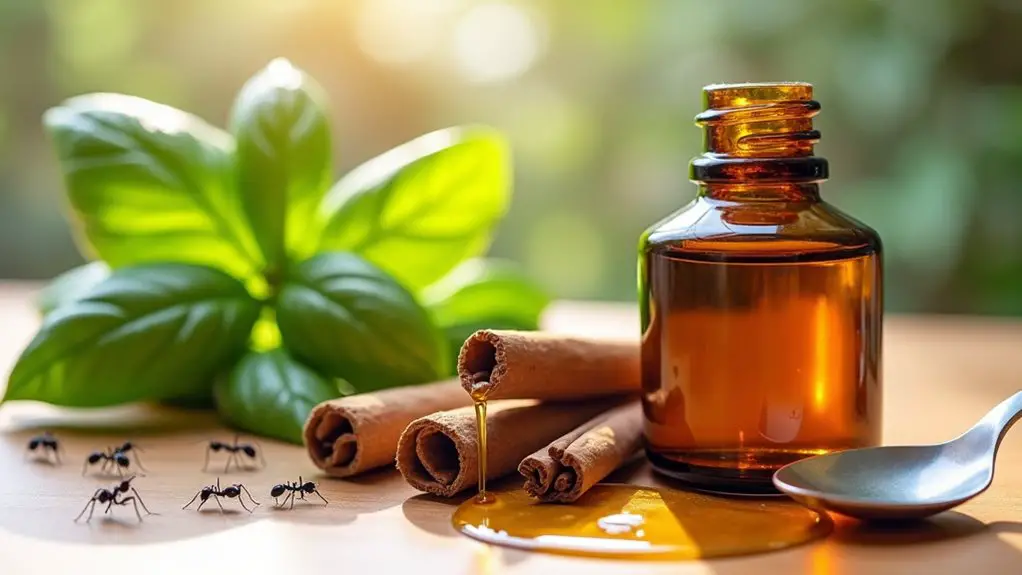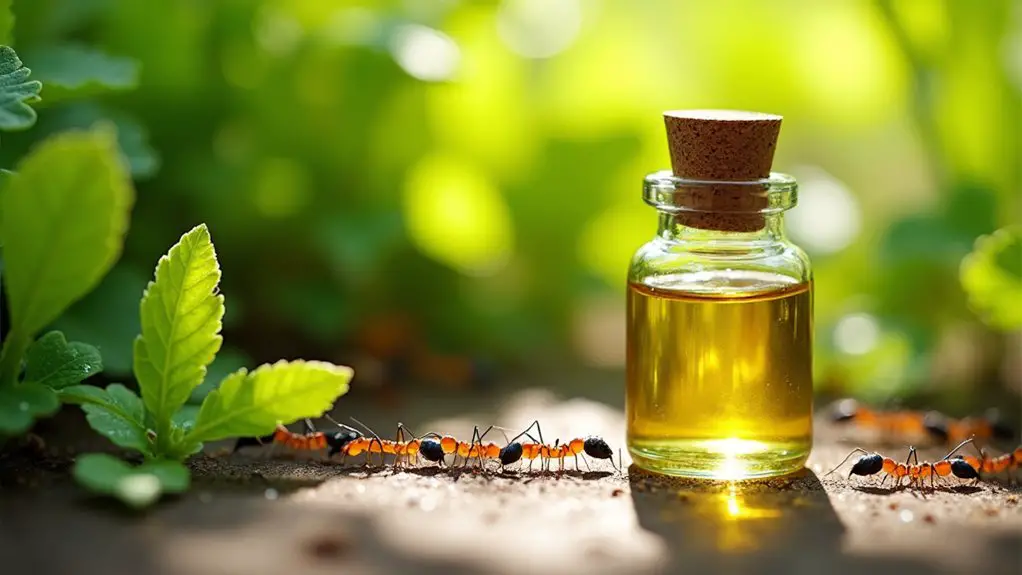3 Best Essential Oils to Keep Ants Away

Like invisible chemical highways disrupting your home’s peace, ant trails represent a complex communication network you can effectively interrupt with targeted essential oils. You’ll find that tea tree, cinnamon, and citronella oils don’t just mask odors—they actively interfere with pheromone signaling pathways that guide foraging behavior. Research demonstrates these compounds create sensory confusion in ant colonies, but understanding the specific mechanisms behind each oil’s effectiveness reveals why certain application methods produce dramatically different results.
Tea Tree Oil: The Ultimate Ant Barrier
When ants encounter tea tree oil‘s potent aroma, they’ll immediately retreat due to the compound terpinen-4-ol disrupting their chemical communication pathways.
You’re fundamentally creating an impenetrable scent barrier that blocks their ability to follow pheromone trails, forcing them to abandon their foraging routes. At 5% concentration, tea tree oil demonstrates remarkable dual-action properties—functioning as both repellent and pesticide with 100% mortality rates against certain insects.
To maximize effectiveness, you’ll want to dilute 5-10 drops in 2 cups of water for spray applications or saturate cotton balls for strategic placement.
Refresh your barriers weekly as volatilization reduces potency. For enhanced results, combine with peppermint oil to balance scent intensity while maintaining deterrent strength. The fresh, clean smell of tea tree oil provides an added benefit for homeowners seeking natural pest control solutions.
This evidence-based approach guarantees you’re disrupting ant colonies at their foundational communication level.
Cinnamon Essential Oil: Powerful Natural Deterrent

Cinnamon essential oil delivers superior ant-repelling performance through its primary bioactive compound, trans-cinnamaldehyde, which disrupts ant neurological pathways and communication systems more effectively than ground cinnamon or common household deterrents.
You’ll achieve dose-dependent repellency rates when applying higher concentrations around entry points, creating exclusion zones that prevent colony establishment.
The oil’s distinctive aroma interferes with pheromone trails, disorienting foraging behavior and navigation patterns.
You can enhance efficacy by combining cinnamon oil with complementary natural repellents like lemon juice for synergistic effects.
Undiluted Ceylon cinnamon leaf oil containing eugenol provides contact mortality, while diluted formulations offer safer long-term prevention. However, grocery store cinnamon lacks the concentration needed for effective ant control compared to these concentrated essential oil formulations.
This non-toxic alternative protects your family and pets while maintaining consistent ant control through regular application protocols.
Citronella Oil: Disrupting Ant Communication and Foraging

Although citronella oil lacks extensive direct research in ant species, its primary bioactive compound citronellal demonstrates potent olfactory disruption mechanisms that interfere with ant pheromone communication systems and foraging behaviors.
The monoterpenes in citronella—including geraniol and citronellol—mask established scent trails that ants depend on for navigation and recruitment.
You’ll observe behavioral changes when citronella disrupts their chemical communication, reducing colony coordination and food-site recruitment efficiency.
Apply citronella as a spray targeting entry points and active trails, though you’ll need frequent reapplication due to its volatility at room temperature.
While research in related insect species supports these mechanisms, combine citronella with physical barriers for peak results. Laboratory studies demonstrate that citronella exposure can cause morphological changes in hemocyte structures that are critical for insect immune function and physiological processes.
This eco-friendly approach offers broad-spectrum pest deterrence while remaining safe for your household.
Frequently Asked Questions
How Long Do Essential Oils Remain Effective as Ant Repellents?
You’ll find essential oils remain effective for 1-2 weeks indoors, but only hours to days outdoors. Volatility causes rapid evaporation, requiring frequent reapplication based on environmental conditions and specific oil compositions you’re using.
Can Essential Oils Harm Pets or Children When Used for Ant Control?
Your home’s seemingly safe ant deterrents could pose hidden dangers. You’ll find tea tree and eucalyptus oils exhibit documented toxicity when ingested by pets or children, requiring careful placement strategies to protect your family members effectively.
What’s the Best Way to Dilute Essential Oils for Ant Repellent Sprays?
You’ll achieve ideal results by diluting 10-15 drops of essential oil per cup of water in your spray bottle. Add a teaspoon of dish soap as an emulsifier to enhance distribution and effectiveness against ant trails.
Do Essential Oils Work on All Ant Species Equally Well?
You’re charting uncharted territories—essential oils don’t work uniformly across ant species. Fire ants resist certain oils while succumbing to thyme, whereas broad-spectrum oils like cinnamon show wider efficacy through species-specific olfactory disruption mechanisms.
How Often Should I Reapply Essential Oil Treatments for Continued Effectiveness?
You’ll need to reapply essential oil treatments every 1-2 weeks for peak ant deterrence. Monitor ant activity closely—increased foraging behavior indicates diminished repellent efficacy, requiring immediate reapplication regardless of timeline.
